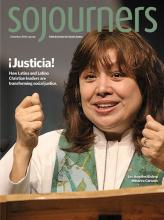#BLACKLIVESMATTER is being touted as our uniquely contemporary civil rights movement. Yet it bears striking resemblance to the black power movement of decades past.
Who can represent #BlackLivesMatter, be involved, or be its leaders? It’s clear that black people can. Can others? And what sorts of black folks? Ben Carson? Cornel West? Two of the three co-founders are queer black women. And what about the role of the faith community, of clergy? The movement’s incredible racial justice work notwithstanding, it puts on display the identity politics that continue to complicate the body politic in contemporary American life.
Jennifer Harvey’s Dear White Christians: For Those Still Longing for Racial Reconciliation (Eerdmans) is one of the most significant recent books addressing identity and politics, focusing on the intersections of race, anti-racism, and religion. In its pages, Harvey, an American Baptist minister and associate professor of religion at Drake University, deconstructs reconciliation as a paradigm and offers a constructive practical vision of reparations. Harvey’s work in trying to make sense of her own embodied white identity—through her studies at Union Theological Seminary and service in a host of ministry settings addressing racial justice—provides background that allows her to explore multiple racial justice issues, making her book relevant for an intercultural audience.
Harvey’s thesis is clear: Reconciliation as a paradigm has failed to address racial injustice in the U.S., and the church needs to shift to a reparations paradigm to better address our racial situation. In a reconciliation paradigm, racial separation denotes racism, making diversity and togetherness the primary criteria for determining racial righteousness in the church. Issues related to structural justice are significant within visions of reconciliation, but they take a back seat to the ultimate concern of inclusion.
Read the Full Article

